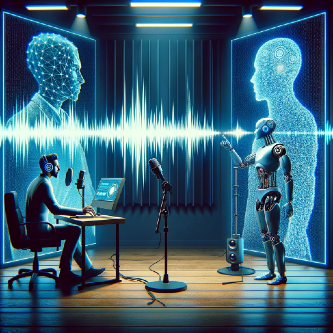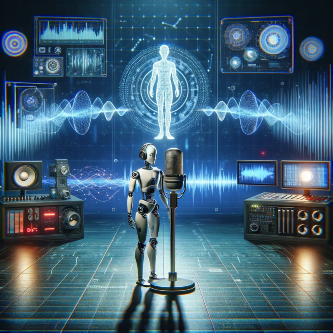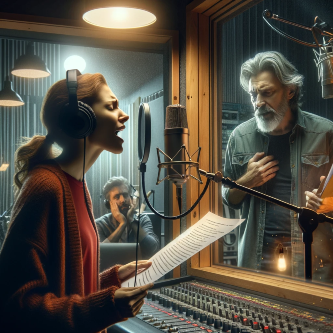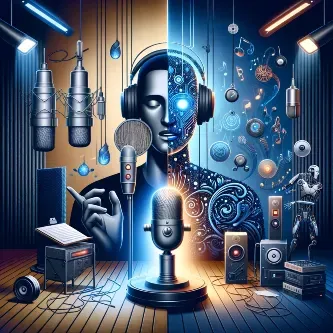Will AI Replace Video Game Voice Actors?
Video game developers are increasingly turning to AI voice technology—but does that mean that AI will replace human voice actors entirely?

In recent years, the video game industry has witnessed an unprecedented technological revolution, spearheaded by the integration of Artificial Intelligence (AI). From creating more engaging player experiences to automating complex tasks, AI's impact is profound and far-reaching.
Among its various applications, one area that has sparked considerable debate is the use of AI in generating voice acting for video games. This innovative approach promises to streamline content creation and offer new capabilities, but it also raises questions about the future of traditional voice acting roles.
As AI continues to evolve, it becomes crucial to explore how this technology might reshape the landscape of voice acting in video games, weighing its benefits against the potential drawbacks and ethical considerations.
Are AI Voices As Good as Human Voice Actors?
The integration of AI in voice acting for video games has sparked a debate about the capabilities and limitations of artificial voices compared to their human counterparts. This section delves into the strengths and challenges of using AI voiceovers, alongside the benefits and drawbacks of relying on human voice actors, to provide a comprehensive perspective on this evolving landscape.
The Pros of Using AI Voiceovers

AI voiceovers offer a range of advantages, helping video game developers create games more quickly, easily, and cost-effectively than before:
- Cost-Effectiveness: AI significantly reduces the costs associated with hiring, recording, and editing voiceovers. Voiceover artists make up to $10,000 per game. For reference, this is the equivalent of 2.5 years’ worth of ElevenLabs’ most expensive subscription.
- Scalability: AI voices can easily handle large volumes of dialogue, making them ideal for expansive game worlds.
- Speed: AI technology allows for rapid voiceover production, which is crucial for meeting tight development schedules. With text-to-speech tools like ElevenLabs, you can instantly turn your video game script into character dialog in a few clicks of a button.
- Versatility: With AI, developers can access a wide range of voices, accents, and languages without the need for multiple actors.


- Consistency: AI voiceovers maintain a consistent tone and quality, which can be particularly beneficial for long-term projects.
- Choice: Tools like ElevenLabs boast vast Voice Libraries filled with different character voices. Find the perfect voices for your game in minutes.
The Challenges of Using AI Voiceovers
Despite their benefits, AI voiceovers also present several challenges:
- Emotional Depth: AI-generated voices may lack the emotional range and nuance that human actors bring to a performance.
- Customization: While AI voices are versatile, achieving specific emotional tones or unique character voices can be difficult.
- Public Perception: Some audiences may have reservations about AI voices, perceiving them as less authentic or engaging.
- Technical Limitations: AI voices might struggle with complex linguistic nuances, such as sarcasm, humor, or cultural references.
The Pros of Using Human Voice Actors

However, there are a range of reasons why you might want to consider using human voice actors. These include the following:
- Emotional Authenticity: Human actors excel at conveying a wide spectrum of emotions, making characters more relatable and stories more immersive.
- Unique Character Voices: Human actors can bring a distinctive personality to characters, enriching the gaming experience.
- Versatility in Performance: They can adapt their performance based on directorial feedback, enhancing the narrative's impact.
- Cultural Sensitivity: Human actors are better at navigating cultural nuances and adapting their performance accordingly.
The Cons of Using Human Voice Actors
That being said, there are also significant drawbacks to using human voice actors:
- Higher Costs: Hiring voice actors, especially well-known ones, can significantly increase production expenses.
- Scheduling Challenges: Coordinating recording sessions with actors can lead to delays in the development process.
- Limitations in Scalability: Recording large amounts of dialogue with human actors can be time-consuming and less flexible than AI alternatives.
- Inconsistencies: Human performances may vary over time, which can affect the continuity of long-term projects.
This exploration reveals that both AI and human voiceovers have their unique strengths and weaknesses. The choice between them depends on the specific needs and goals of the video game project, as well as the desired impact on the audience.
Harnessing the Best of Both Worlds
While AI voice actors and human voice actors each have their own strengths and weaknesses, the future of voice acting in video games may lie in the synergy of both. By combining the emotional depth and creativity of human actors with the efficiency and localization capabilities of AI dubbing tools, game developers can create richer, more immersive experiences for players worldwide.
The ideal approach is to have human voice actors provide the initial voiceover performances, capturing all the nuance, emotion and personality they bring. These performances can then be fed into an AI dubbing tool like ElevenLabs to generate localized versions in other languages.
This allows developers to benefit from the acting skills that human voice talent offers while leveraging AI to cost-effectively expand their global reach. Best of all, the AI learns from the human performance to maintain emotional resonance and acting quality across language versions.
As the gaming industry becomes increasingly global, the ability to deliver emotionally engaging, localized experiences is more crucial than ever. The harmonious blend of human voice acting and AI dubbing tools like ElevenLabs represents an exciting path forward.
By combining the artistry of human actors with the technical capabilities of AI, developers can create narrative experiences that transcend language barriers and resonate with players on a profound level worldwide. It's a win-win.
Ethical Implications of Using AI for Voice Acting in Games

The integration of Artificial Intelligence (AI) into voice acting for video games is not just a technological leap but also opens up a Pandora's box of ethical considerations.
As developers, embracing AI tools like ElevenLabs offers unparalleled efficiencies and capabilities, yet it's essential to navigate the moral landscape thoughtfully.
This section delves into the ethical implications that arise with the use of AI in voice acting, aiming to foster a responsible approach to leveraging such technologies.
Respecting Artistic Integrity and Labor
Voice acting is an art form that involves emotion, creativity, and human experience. Replacing or supplementing human actors with AI poses questions about the devaluation of artistic integrity and the potential for job displacement.
The emergence of AI technologies could potentially reduce the demand for human voice actors, leading to ethical concerns regarding fair compensation and recognition of original performances used to train AI models. Therefore, it’s crucial to ensure that actors are compensated for their contributions to AI's learning process.
Authenticity and Representation
AI-generated voices may lack the nuanced understanding of cultural contexts and emotional subtleties that human actors naturally bring to their performances. Ethically, it's important to consider how this might affect the authenticity of characters and the representation of diverse cultures and emotions in games.
What’s more, utilizing AI in voice acting should not bypass opportunities for diverse and inclusive casting. Ethical use of AI should complement efforts to represent a wide range of voices and experiences authentically, rather than homogenizing game narratives.
Transparency and Consent
Developers should be transparent with audiences about the use of AI-generated voices in games. Players deserve to know when the characters they connect with are voiced by humans or AI, as this transparency respects the audience's right to be informed.
When using human performances to train AI models, you should obtain explicit consent from voice actors. Actors should be fully aware of how their voices and performances will be used and to what extent.
Data Privacy and Security
Voice recordings used to train AI models contain personal data. Ensuring the security and privacy of this data is paramount to protect individuals from potential misuse or exploitation of their biometric information.
As we forge ahead with AI in game development, prioritizing ethical AI development that considers the impact on individuals, communities, and the industry as a whole is vital. This includes ongoing dialogues with all stakeholders involved—developers, voice actors, and players—to shape a future where AI enhances the gaming experience without compromising ethical standards.
Final Thoughts
The journey of voice acting in video games has evolved from purely human performances to the introduction of AI-generated voices. As the gaming industry continues to grow and mature, the choice between AI and human voice actors will depend on each project's specific needs, budget, and creative vision.
Both AI and human voice actors have crucial roles to play in the future of digital storytelling. While AI offers efficiency, cost-effectiveness, and multilingual capabilities, human actors bring emotional depth, versatility, and creativity to their performances. By leveraging the strengths of both, developers can create immersive and emotionally engaging narratives that resonate with players on a profound level.
As technology advances and the synergy between AI and human talent grows stronger, the voice of tomorrow in video games will be a harmonious blend of the digital and the human, each complementing the other to deliver unforgettable auditory experiences that transport players to new worlds and connect them with compelling characters.
Ready to start using AI voiceovers within your video game? Check out ElevenLabs's text-to-speech and dubbing features, or browse through our extensive AI voice library.
FAQs
What is AI voice technology, and how is it being used in video games?
AI voice technology involves using artificial intelligence to generate or modify speech. In video games, it's used to create dynamic and diverse character dialogues, offering scalability for blockbuster and indie games alike.
Can AI voice clones truly capture the essence of prominent voice actors?
AI voice clones can mimic the tonal qualities and speech patterns of prominent voice actors, but capturing the full range of emotions and subtle nuances often requires human actors. The technology is advancing rapidly, aiming to bridge this gap.
How do game studios decide between employing AI voices and hiring voice actors?
The decision often hinges on factors like budget, project scope, and the need for emotional depth in character portrayal. While major studios may opt for famous human actors for key roles, AI voices offer a cost-effective solution for extensive dialogues and indie game projects.
Are actors' unions, like SAG-AFTRA, concerned about AI technology replacing actors?
Yes, actors' unions are actively engaging in discussions about AI's role in the industry, advocating for policies that protect actors' jobs and ensure fair compensation for the use of their voices and likenesses in creating AI voice clones.
How can AI voice technology make a character sound older or embody distinct emotions?
AI systems can be programmed with voice data that reflects age-related vocal characteristics or specific emotional states. However, achieving nuanced performance that reflects complex emotions still poses challenges.
What are the ethical implications of creating voice clones of video game actors?
The ethical considerations involve consent, compensation, and the potential misuse of an actor's voice. Transparent agreements between actors and game developers are essential to address these concerns.
What new opportunities does AI voice technology offer to independent developers?
AI voice technology opens up new possibilities for indie developers by making high-quality voice acting more accessible and affordable, allowing for more creative freedom in developing immersive video game worlds.
Can AI voice technology create voices with specific accents, like a Cockney accent?
Yes, AI voice technology can generate voices with a wide range of accents, including specific regional dialects like Cockney, offering developers more versatility in character creation.
How are video game studios and actors' unions like SAG-AFTRA navigating the future of AI in voice acting?
Video game studios and actors' unions are exploring agreements that respect the contributions of human actors while embracing the innovations AI technology brings. This includes discussions about compensation models for voice data used to train AI and new revenue streams for actors in the era of digital and interactive media.
